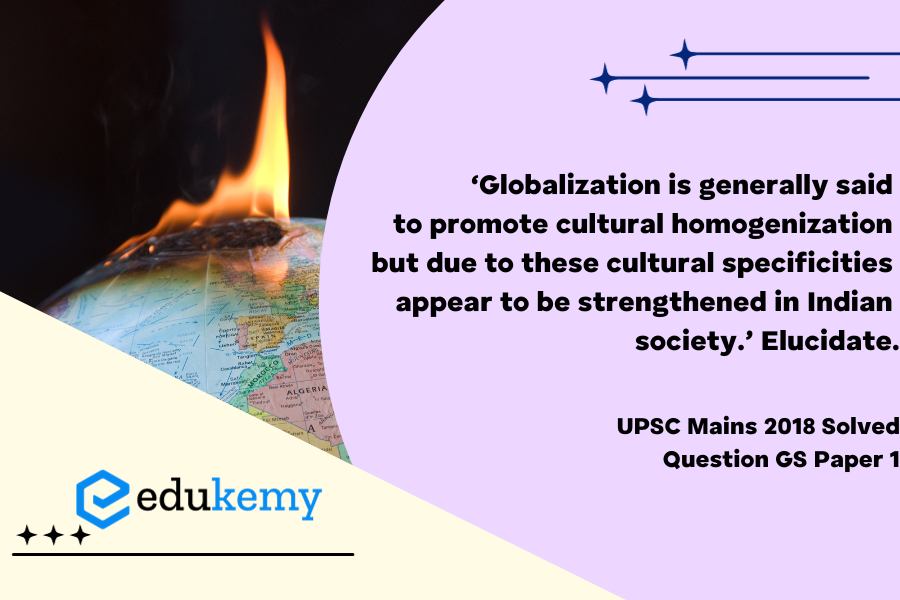Globalization, often considered a catalyst for cultural homogenization, paradoxically manifests differently in Indian society, where cultural specificities appear to be fortified rather than diluted. While the interconnected global landscape has led to the dissemination of Western values and practices, India, with its rich tapestry of traditions, has adeptly retained and even reinforced its cultural distinctiveness. The resilience of India’s diverse cultural heritage is evident in the vibrant coexistence of various linguistic, religious, and artistic traditions. The assimilation of global influences has not supplanted indigenous customs but has instead spurred a renewed interest in preserving and celebrating unique cultural identities. This phenomenon challenges the conventional narrative of cultural erosion under globalization, highlighting the adaptability and resilience of Indian society in embracing global currents while safeguarding its distinctive cultural tapestry. The intricate interplay between globalization and cultural specificity in India thus unveils a nuanced dynamic that defies simplistic notions of homogenization.
Tag: Effects of globalization on Indian society.
Contents
Decoding the Question:
- In the Introduction, try to define Globalization and how it helps to promote Cultural Homogenization.
- In the Body, mention the points suggesting that globalization has strengthened cultural specificities in Indian Society.
- Conclude by showing how globalization has the potential to create a new culture to strengthen Indian society.
Answer:
Globalization is a process in which the world becomes a global village as national and regional economies, societies, and cultures get integrated through the network of trade, communication, migration, and transportation. It primarily is an interchange of economic, social, cultural, political, and technological attributes that takes place between societies when different societies meet each other.

Evidence Suggesting that Globalization Has Impacted Indian Society:
- Globalization is leaving its footprints on almost every aspect of Indian society such as language (English), cuisine, clothing, etc., and thus leading to homogenization in many respects.
- There is an increasing tendency towards ‘globalization’ of culture which refers to the mixing of the global with the local culture.
- In the field of music, one can see the growth of popularity of ‘Bhangra pop’, ‘Indi pop’, fusion music, and even remixes.
- Presently, cultural consumption (of art, food, fashion, music, and tourism) shapes to a large extent the growth of cities. This is evident in the spurt in the growth of shopping malls, multiplex cinema halls, amusement parks, and ‘water world’ in every major city in India.
- Liberal ideas of individualism are permeating Indian society; joint families are giving way to nuclear families; live-in relationships are proliferating; celebration of Valentine’s Day, and Mother’s Day; consumption of pizza, burgers, chowmein, etc.
However, globalization is not simply about homogenization, it is also strengthening cultural specificity in India:
- Indian classical dance and music have got a fillip in recent years with the efforts of organizations like SPIC MACAY and others.
- Local customs and festivals are being observed by some tribal groups, especially in North-east India more zealously than before.
- Indian culture has also spread its impact globally. Yoga traditions and practices are not only being practiced by Indians, but people across the globe are embracing them.
- The Indian system of Ayurveda is being promoted by a large section of society in the backdrop of the ills of the Western system of medicine and cure. For example profuse use of ‘Patanjali’ products by the middle and lower middle classes of India.
The intensity of Indian culture has been its open-ended approach. Throughout the modern period, reformers and nationalists actively debated tradition and culture. Culture cannot be viewed as an unchanging fixed entity that can either collapse or persist the same when faced with social change. What is more expected even today, is that globalization will take the lead to the formation of not just new local traditions but global ones too, while the cultural specificities in Indian society will continue to remain strengthened.
In case you still have your doubts, contact us on 9811333901.
For UPSC Prelims Resources, Click here
For Daily Updates and Study Material:
Join our Telegram Channel – Edukemy for IAS
- 1. Learn through Videos – here
- 2. Be Exam Ready by Practicing Daily MCQs – here
- 3. Daily Newsletter – Get all your Current Affairs Covered – here
- 4. Mains Answer Writing Practice – here


